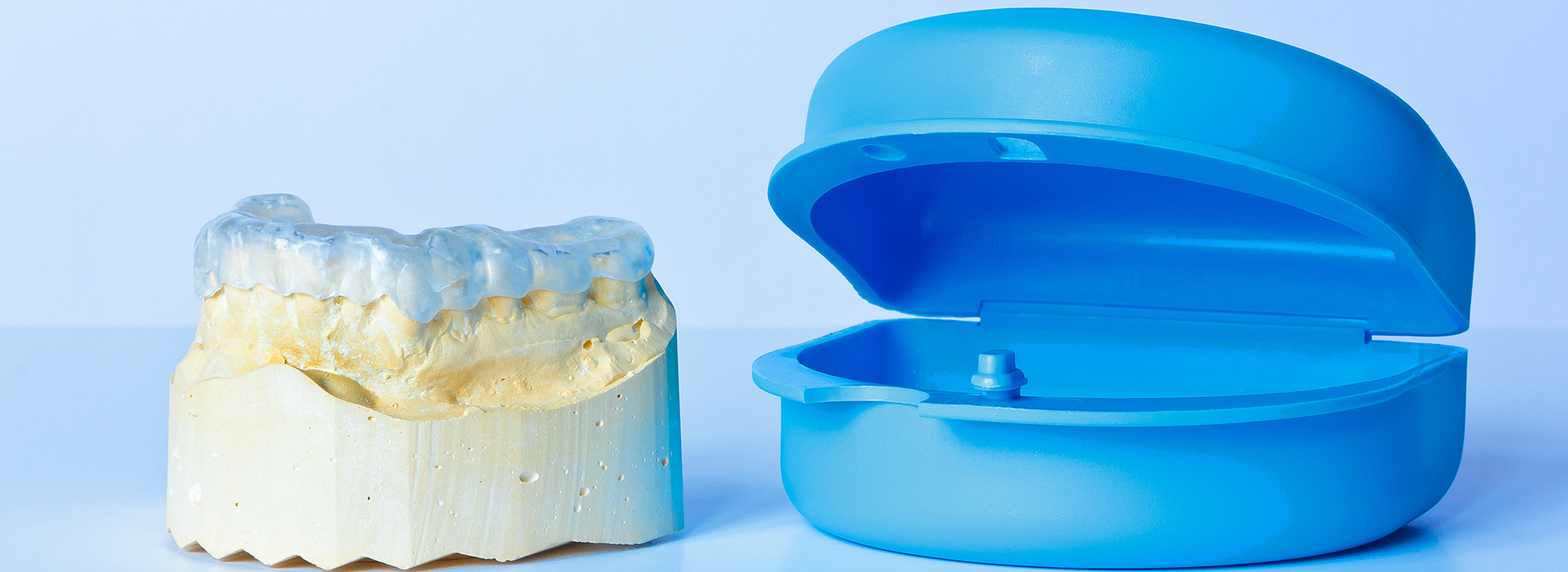Serving Avondale and the West Valley
Serving Avondale and the West Valley

Bruxism is the medical term for repetitive jaw clenching and teeth grinding. Although some people grind their teeth during the day, many are unaware they do it because the habit often happens during sleep. Typical signs include waking with a sore jaw, morning headaches, increased tooth sensitivity, and teeth that appear flattened, chipped, or loosened over time. Left unchecked, the cumulative damage from nightly grinding can compromise both tooth structure and the comfort of the jaw joint.
Patients frequently describe a sense of tension in the temples or a tightness along the sides of the face that builds overnight. Over months and years this muscular strain can contribute to problems with the temporomandibular joint (TMJ), including pain, clicking, or a limited ability to open the mouth. Because symptoms vary and sometimes overlap with other conditions, a dental evaluation is the most reliable way to determine whether bruxism is present and whether a protective appliance could help.
Beyond dental wear, bruxism can affect sleep quality and daytime function. Interrupted sleep or discomfort can leave a person feeling fatigued, less focused, and more prone to pain. Recognizing the signs early gives patients the opportunity to preserve their teeth and address contributing factors before more extensive treatment becomes necessary.
A night guard is a removable oral appliance worn over the teeth during sleep. Its design serves several purposes: it creates a durable barrier between upper and lower teeth, redistributes biting forces to reduce localized pressure, and helps prevent direct tooth-to-tooth contact that leads to chipping and wear. By keeping the jaw slightly apart, an appropriately fitted guard also decreases muscular strain and can reduce stress on the TMJ during episodes of grinding.
Wearing a night guard doesn’t cure the underlying causes of bruxism, but it does significantly lower the risk of irreversible dental damage. For many patients, the immediate benefit is preserving enamel and restorative work. Over time, a consistent habit of wearing a guard can also make it easier to manage muscle tension and improve comfort on waking.
When fit and fabricated correctly, night guards are comfortable enough for nightly use and simple to incorporate into a bedtime routine. The device should feel secure without causing jaw fatigue, which is why a personalized fitting and professional adjustment are important steps in the process.
Night guards come in several basic forms, from thin, over-the-counter boil-and-bite products to professionally made custom appliances. Over-the-counter options can offer temporary protection, but they often lack the precise fit and durability of a custom-made device. Custom night guards are crafted from impressions or digital scans of your teeth and are designed to match your bite, which improves comfort and effectiveness.
Within the custom category there are variations in material and thickness. Hard acrylic appliances are highly durable and are commonly recommended for heavier grinding because they provide a stable surface that resists deformation. Softer, more flexible materials can be a good choice for mild grinding or when the priority is immediate comfort. Your dentist will discuss the clinical factors—such as the intensity of grinding, tooth alignment, and any TMJ concerns—that influence which option is best suited to your situation.
Rather than choosing an appliance solely on convenience, consider the long-term goal: protecting natural teeth and maintaining jaw comfort. A well-fitted, professionally adjusted night guard is typically the most reliable way to achieve those outcomes, and the dental team can explain the pros and cons of each material and design in the context of your oral health.
The first step is a thorough dental examination to assess tooth wear, jaw function, and any signs of TMJ stress. The dentist will review your medical and sleep history and may ask questions about sleep quality, daytime tension, and factors such as caffeine or medication that can influence muscle activity. This evaluation helps determine whether a night guard is the appropriate intervention or whether additional evaluation—such as a sleep study or referral to a specialist—is warranted.
If a night guard is recommended, most modern practices use either an intraoral scan or traditional impressions to capture the precise anatomy of your teeth. Those records are used to fabricate an appliance that fits snugly and aligns with your bite. After the device is made, the clinician will perform a fitting appointment to fine-tune contacts and ensure the guard does not alter your bite or cause jaw discomfort. Small adjustments at this stage are normal and help ensure long-term comfort.
Follow-up care is important. The dental team will recommend an interval for checking the appliance and the condition of your teeth and jaw—typically within a few weeks of delivery and then periodically thereafter. These visits allow your provider to monitor wear on the guard, evaluate changes in symptoms, and make adjustments as needed to maintain effectiveness.
With proper care, a night guard will remain a reliable part of your oral health routine. Daily cleaning—rinsing after use and brushing gently with non-abrasive soap or toothpaste—helps prevent buildup of bacteria and odors. When not in use, store the appliance in its protective case away from direct heat or sunlight, which can warp many materials. Avoid chewing on the device, as that accelerates wear and can reduce its protective function.
Inspect your night guard regularly for thinning, cracks, or deformation. If you notice changes in fit, persistent discomfort, or new jaw symptoms, schedule an appointment for evaluation. Excessive wear on the guard can indicate increased grinding intensity and may prompt consideration of a different material or design. Likewise, if your dental restorations shift or new dental problems arise, the guard may need to be refitted or remade to maintain proper protection.
Because bruxism can be influenced by sleep disturbances, stress, and changes in oral health, ongoing communication with your dentist ensures the appliance remains effective. The practice will track progress and recommend next steps when patterns change—whether that means adjustments to the guard, additional therapy for muscle relaxation, or coordination with medical providers for sleep-related concerns.
At Summit Family Dentistry we focus on practical, evidence-based solutions that protect your oral health and keep you comfortable. If teeth grinding or jaw discomfort is affecting your sleep or daily life, contact us to learn whether a night guard may help. Our team can assess your situation, explain the options, and guide you through a personalized fitting and follow-up plan.

A night guard is a removable oral appliance worn during sleep to protect teeth from grinding and clenching. It creates a durable barrier between upper and lower teeth and redistributes biting forces to reduce localized pressure. By preventing direct tooth-to-tooth contact, a properly fitted guard helps limit chipping, enamel wear, and damage to restorations.
Night guards also reduce muscular strain by slightly altering jaw position and absorbing force during episodes of bruxism. They do not cure the underlying causes of grinding but provide an effective way to prevent progressive dental wear while those causes are investigated. Comfort and fit are important to maintain nightly use and long-term protection.
Common signs of nighttime grinding include waking with a sore or tired jaw, morning headaches, increased tooth sensitivity, and teeth that look flattened, chipped, or shortened. Many people are unaware of grinding because it happens during sleep, so a partner may report audible grinding noises or clicking. A dental exam is often the first step in identifying bruxism because dentists can see wear patterns and other oral signs that indicate ongoing grinding.
In addition to dental findings, patients may report facial tension that builds overnight or difficulty opening the mouth without discomfort. Because symptoms can overlap with other conditions, your dentist will consider medical and sleep history and may recommend further evaluation if another condition is suspected. Early recognition allows for interventions that preserve tooth structure and reduce the risk of more extensive treatment later on.
Night guards range from over-the-counter boil-and-bite products to professionally fabricated custom appliances made from impressions or digital scans. Over-the-counter options can provide temporary protection but often lack precise fit and durability, while custom guards are tailored to your bite and usually offer better long-term comfort and effectiveness. Within custom appliances, clinicians commonly use rigid acrylic for heavy grinders and softer materials for milder clenching or when immediate comfort is a priority.
The choice of material and design depends on clinical factors such as grinding intensity, tooth alignment, and any temporomandibular joint concerns. Hard acrylic guards resist deformation and protect restorations, while softer designs can cushion forces but wear faster. Your dentist will explain the trade-offs so you can choose the appliance that best matches your oral health goals.
Custom night guards are generally worth the investment when you need reliable protection and a good long-term fit because they are made from precise impressions or scans of your teeth. That accurate fit improves comfort, reduces the chance of jaw fatigue, and offers consistent protection for enamel and dental work. Over-the-counter guards can be a short-term measure but may not accommodate individual bite dynamics, which can limit their effectiveness for many patients.
A custom device also allows the dentist to adjust contacts and balance forces so the appliance supports healthier jaw function. Regular follow-up lets your provider monitor wear and make refinements, which helps maintain effectiveness over time. For patients with significant wear or restorative work to protect, a professionally made guard is often the most reliable option.
The process begins with a dental examination to assess tooth wear, jaw function, and any signs of TMJ stress, along with a review of your medical and sleep history. If a guard is recommended, the practice will capture impressions or use an intraoral digital scan to record your bite accurately. These records are used to fabricate an appliance that fits snugly and aligns with your occlusion.
When the guard is delivered, the dentist will perform adjustments to ensure even contacts and to prevent changes to your natural bite. Small refinements at the fitting appointment are normal and help avoid jaw discomfort or altered jaw posture. Follow-up visits are scheduled to check fit, evaluate wear, and make further adjustments as needed.
A properly fitted night guard is designed to protect teeth without permanently changing your bite or causing jaw issues; initial adaptation may include mild awareness of the appliance or temporary muscle soreness. The fitting and adjustment process helps balance contacts so the device does not introduce harmful forces or encourage a new bite relationship. If discomfort persists, the guard can be modified or remade to address fit concerns and preserve jaw comfort.
Patients with existing TMJ symptoms should have those conditions evaluated as part of the night guard process so the appliance supports, rather than exacerbates, jaw function. Ongoing communication with the dental team permits adjustments if new symptoms arise. Rarely, a guard that is too bulky or improperly balanced can cause problems, which is why professional fabrication and follow-up are important.
Daily cleaning helps prevent bacterial buildup and odors; rinse the guard after removing it and brush gently with a soft toothbrush and non-abrasive soap or toothpaste. Avoid harsh cleaners and bleach, which can degrade materials, and never use boiling water or high heat that can warp the appliance. After cleaning, allow the guard to dry and store it in its protective case away from direct sunlight and heat sources.
Regularly inspect the guard for cracks, thinning, or distortion, and bring these observations to your dentist so the device can be evaluated. If you have any oral infection or illness, follow your dentist's recommendations about additional cleaning or temporary suspension of use. Proper care not only maintains hygiene but also extends the functional life of the appliance.
The lifespan of a night guard varies by material, grinding intensity, and how well it is cared for, but many patients can expect several months to a few years of service from a well-made custom device. Hard acrylic appliances tend to last longer for heavy grinders, while softer guards will wear more quickly and may need more frequent replacement. Regular checkups allow your dentist to monitor wear patterns and recommend replacement before the guard stops providing effective protection.
Signs that indicate replacement include visible thinning, cracks, persistent changes in fit, or new jaw discomfort when wearing the appliance. Excessive wear on the guard can also signal that grinding intensity has increased and that a different material or design may be appropriate. Prompt attention to these signs helps prevent dental damage and maintains consistent protection.
For some patients, a night guard reduces muscular strain and decreases the frequency or severity of morning headaches that are related to nocturnal bruxism. By absorbing and redistributing biting forces, the appliance can lower stress on the jaw muscles and temporomandibular joint during sleep. However, because TMJ disorders and headaches have multiple possible causes, a night guard is one component of care rather than a guaranteed cure.
Your dentist will evaluate jaw function and pain patterns to determine whether a guard is likely to help or if additional therapies—such as physical therapy, behavior modification, or referral to a specialist—are needed. Regular follow-up allows the dental team to track symptom changes and adjust the treatment plan accordingly. Combining a night guard with other targeted interventions often yields the best results for persistent TMJ pain or chronic headaches.
At Summit Family Dentistry in Avondale, care begins with a thorough evaluation of tooth wear, jaw function, and relevant medical and sleep history to determine whether a night guard is appropriate. When a custom appliance is indicated, the team uses precise impressions or digital scans to fabricate a device tailored to the patient's bite and clinical needs, then completes a fitting and any necessary adjustments. Follow-up appointments are scheduled to monitor appliance wear, symptom improvement, and any changes in oral health.
The practice emphasizes evidence-based recommendations and clear communication so patients understand expected benefits and how the appliance fits into a broader plan for oral health. If symptoms suggest additional issues—such as a sleep disorder or advanced TMJ concerns—the dental team coordinates care or referrals with appropriate providers. This comprehensive approach helps protect teeth, reduce muscle strain, and support long-term comfort.

Ready to schedule your next appointment or have questions about our services? Our friendly team is here to help with everything from booking visits to answering questions about your treatment options. We’re committed to making the process simple and stress-free.
Whether you prefer to give us a call or fill out our convenient online contact form, reaching us is quick and easy. Don’t wait to take the first step toward a healthier, more confident smile—contact Summit Family Dentistry today!